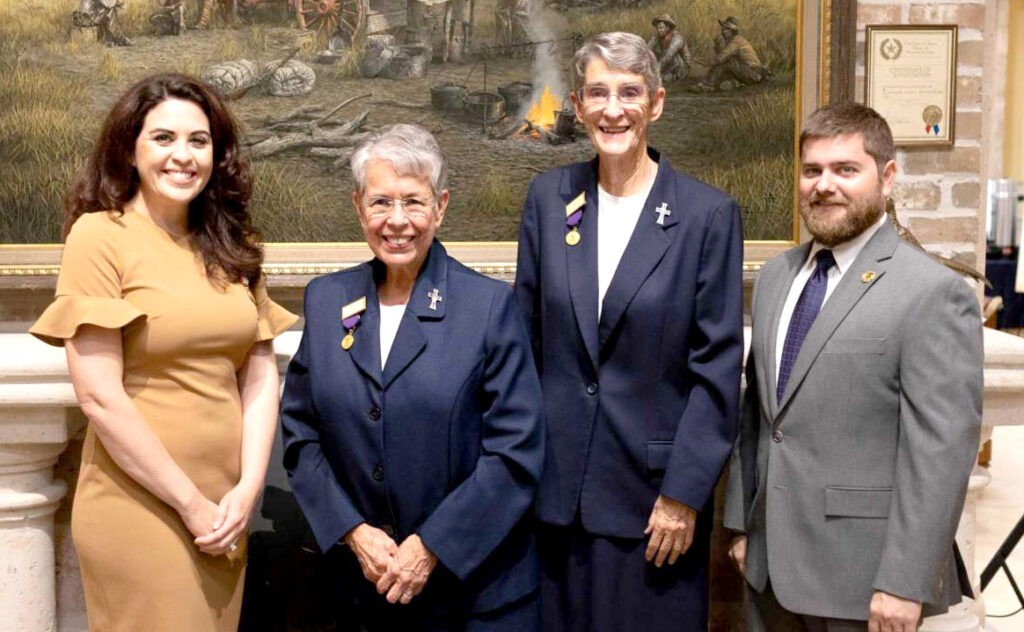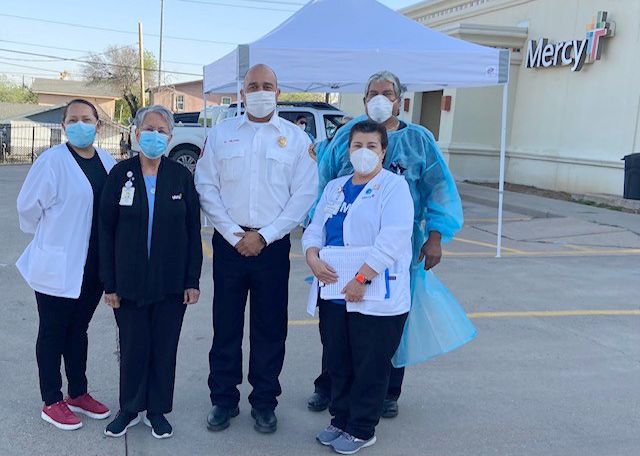By Liz Dossa, Features Writer
Sister María Luisa Vera felt a call to the Mercy Community in the 1960s, but she hesitated: “I met no Sisters of Mercy that looked like me.”
The absence mattered. She had grown up in Brownsville, an intercultural community on the U.S.-Mexico border. People went back and forth between Texas and Mexico as easily as they went back and forth between Spanish and English. An agility between cultures and between languages was part of her.
She began her Mercy journey as a licensed practical nurse at Mercy Hospital in Brownsville, Texas. A kindly mentor in the emergency room, Sister of Mercy Alvera Simon, would drop everything when María Luisa called for help. “I loved her,” said María Luisa. “She was the kind of person who was right there for me.” What better example could there have been?
She did eventually see other sisters with names like Gonzales, Martinez. They were teachers who came to the hospital for physicals during the summer break. She notes, however, that several of those women did not stay.
Still, she was headed toward religious community. “That was a very challenging situation because I didn’t know if I would be accepted, then, if I would be accepted officially, would I belong?”
This question of belonging, for all those who feel “other,” has been a theme throughout Sister María Luisa’s life. Looking for belonging led her to a question she asked as she contemplated final vows as a sister: “What is the potential for the community to be willing to change to reach out to people who are different?”
She did make her final vows in 1971, but she has searched for the answer to this question of growth and change throughout her life within the Sisters of Mercy.
Sister Rosemary Welsh, her good friend since 1970, witnessed many examples of María Luisa’s treatment as second best, from being ignored by waiters, to Rosemary’s aunt saying loudly at the family dinner table, “Does she speak English?” María Luisa’s patient response was, “Yes, and I speak Spanish as well.”
Rosemary said with a sigh, “When I ask her ‘why don’t you get angry,’ she says, ‘You have to choose your battles.’ It is a resilience. She is proud of her culture. She persisted in being the good person she is.”
When María Luisa was nominated for leadership in the St. Louis Region of the Sisters of Mercy, she was hesitant. She told Rosemary, “I don’t feel that this is where I need to be.” Rosemary said, “Remember your questioning diversity and inclusion in the community? Now you have to put your body where your words were.”
She served on the St. Louis Leadership Team from 1985 to 1992, and then was regional president until 1995 when she joined the Institute Leadership Team of the Sisters of Mercy, a role that lasted for 10 years. María Luisa lived in intentional community with fellow leadership team members Sisters Doris Gottemoeller and Marie Chin, as well as with Sister Anne Curtis, then an associate with the Catholic lobby organization NETWORK. “It was a real blessing. With different backgrounds, we had amazing conversations and experiences,” she remembers.
Right: Pictured second from left, Sister María Luisa Vera is pictured with Mercy Clinic staff in Laredo, Texas, which held several COVID-19 drive-by events for clinic patients and their immediate families. Sister María Luisa is the former president of Mercy Ministries of Laredo, which sponsors Mercy Clinic.
Another step toward growth was her work of helping to create the Alliance of Women of Color over 25 years ago. They defined themselves as Sisters of Mercy of Color living within the United States. They came together to support each other in their focus on issues of race, culture and language within the Mercy Community. The members wanted to carry out the intentions set by the 1995 Institute Chapter, a community gathering of sisters, to increase diversity. “We began to talk together that we were part of a community that didn’t always have the opportunity to feel as if we belonged. We came together to talk about issues not addressed in the larger community.”
In her commitment to growth of the Mercy Community, Sister María Luisa has enjoyed being part of leadership teams who have spent years bringing the Sisters of Mercy together into one institute. The work of transforming separate entities into one has involved many visits to local communities, meeting many people and listening. “It was hard work. Look how long it has taken. We saw that a lot of sisters were still resistant. It is hard to hear the pain and resistance.”
She has learned patience. She points out that change takes time. “We say all these beautiful things that help us grow into highest aspirations.”
A dear friend Sister Rose Marie Tresp said, “For me, [María Luisa] epitomizes the wise women in Psalm 31:36: ‘She opens her mouth with wisdom, and the teaching of kindness is on her tongue.’”

